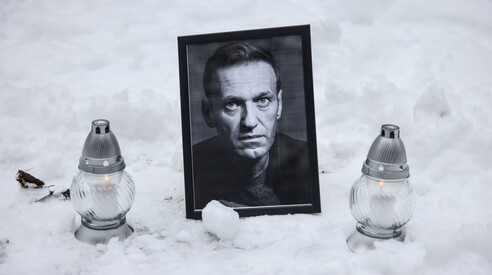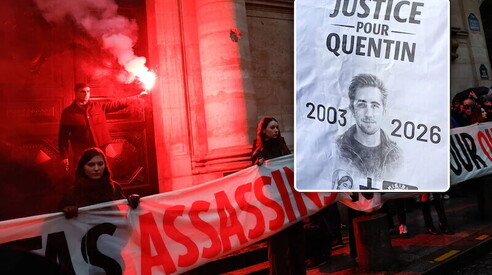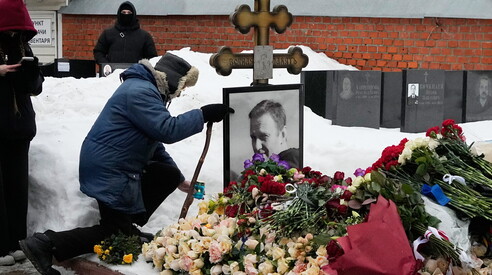
english version
How should U.S. media respond to Trump's attacks on the free press?
The president has made clear his dislike of the traditional independent media, which endeavors to cover him fairly but which he repeatedly accuses of bias against him. So as the campaign against the media escalates, how will some of the biggest names in global media respond?
The big question hanging over the U.S. media right now is: What should they be doing as the Trump storm clouds gather?
The president has made clear his dislike of the traditional independent media, which endeavors to cover him fairly but which he repeatedly accuses of bias against him. He has already singled out the Associated Press newswire, ABC News and CBS News’ parent company, Paramount, with verbal condemnation, restrictions on reporters attending White House events, or legal action - or some combination of the three.
The administration also has revamped how White House news is reported and distributed, favoring pro-Trump outlets and giving the White House a far greater degree of control over what the public knows. And the Justice Department recently rescinded guidance that makes it easier to subpoena journalistic records in investigations over leaked information. It is a playbook we have seen in Hungary, Turkey, India, Russia and elsewhere.
“We talk often about threats to press freedom abroad and we should - but we can’t lose sight of what is happening here at home,” said Mike Balsamo, president of the National Press Club in Washington, D.C., which advocates for media freedoms. Among the concerns he cited at a recent discussion were legal intimidation and “government efforts - subtle or not - to control the narrative and sideline scrutiny.”
He added: “These aren’t distant or abstract concerns - they are happening now and they are happening more often.”
As World Press Freedom Day came and went at the start of May, there cannot be a responsible news industry executive in America who isn’t planning for an escalation of the anti-media campaign.
They don’t have to look far for what that might look like. The Trump administration is hammering other institutions that play a watchdog role in a vibrant democracy - judges, law firms and universities - by calling for judicial impeachments, threatening law firms with exclusion from government work, withholding federal funds that support academic research, or demanding tax investigations.
So as the campaign against the media escalates, how will some of the biggest names in global media respond? Will they stand together publicly in the face of intimidation to assert the primacy of a free press? Or will they normalize the administration’s assault, seek cover while their rivals suffer, and just hope the spotlight doesn’t shine on them?
There is one example that should give us some optimism that the press can be a unified and effective force in the face of government intimidation. When my former colleague Evan Gershkovich was wrongfully arrested by Russian authorities in March 2023 and falsely charged with espionage, there were two immediate priorities for his employer, The Wall Street Journal. One was to convince the world that Gershkovich was not a spy. The other was to apply as much pressure as possible to the U.S. administration to do a deal to get Gershkovich home. As the Journal’s Washington bureau chief, I was tasked with leading that newsroom advocacy, which later became a full -time job.
Our principal message was: Russia’s concocted charges against Gershkovich are an affront to press freedom. And even though this is happening thousands of miles away, it matters to America.
We relied on our colleagues in the U.S. and international media to spread that message and asked them to stand with us as we sought to right this major wrong. The response was unanimous, forthright, and nothing short of inspiring.
In a show of unity that itself generated news, the WSJ, the New York Times and the Washington Post - the three largest-circulation serious newspapers - ran several joint advertisements condemning Gershkovich’s seizure and calling for his release. Major American news organizations pulled reporters out of Moscow. Studios opened for us at NBC, MSNBC, CBS, ABC, Bloomberg, Scripps, PBS, Fox News, National Public Radio, CNN, Voice of America, NewsNation and countless others. Two 24-hour “readathons,” where people read Gershkovich’s work in 15-minute increments, was stocked with a “Who’s Who” of prominent U.S. journalists and news industry executives.
It was a campaign the media industry could feel good about, standing up loudly for one of the pillars on which the entire industry rests. And it worked: Gershkovich and 15 others were released on Aug. 1 last year and U.S. government officials have cited the pressure campaign as a major factor in getting a deal with the Kremlin done.
But how far should that optimism extend?
Gershkovich’s case was very clear cut: a totalitarian regime silencing a brave reporter who has dedicated his young career to chronicling life in a far-off land. And it’s fair to say there was little downside risk for other organizations, very grateful as we were to have their backing. Russia was unlikely to exact retribution on them for their support of us.
When the attacks are less dramatic and closer to home, it inevitably raises more difficult questions for news outlets to grapple with, reducing the likelihood of a loud, coordinated response in defense of press freedom.
For a start, it isn’t clear that the Trump administration would be moved by collective action. They might even welcome it, using it as an excuse to ban more journalists they don’t like in favor of ones they do. How does that serve the public or the cause of press freedom?
Media conglomerates are likely, too, to be wary of the government reprisals they might face to other parts of their business if they are too strident in their opposition to press-freedom attacks.
Paramount has been openly criticized by some of its own CBS journalists for allegedly challenging their reportorial independence. The journalists see it as no coincidence that the fate of a major merger Paramount is trying to execute lies to a large degree with the U.S. government. Many Washington Post employees have a similar complaint - that the newspaper’s owner, Jeff Bezos, appears to them more interested in protecting Amazon’s government business than the independence of the Post, which he owns personally. It should be noted that both newsrooms have covered Trump aggressively and fairly throughout the controversies.
Others will figure that no one individual action against the American press is worth a full-scale response, whatever that might look like. Or they might argue that a robust condemnation of attacks on press freedom will only further alienate the roughly half of Americans who voted for Trump and already view the non-partisan media as untrustworthy.
Valid as all those concerns are, together they have so far made for an underwhelming response that seems inadequate for the moment - and for the further deterioration of press freedom that is widely expected to come.
The greater danger for the U.S. media may be that these individual attacks become normalized, excused, or shrugged off as survivable.
Here is a rough parallel: China has been able to appropriate vast territory in the South China Sea without forceful or coordinated opposition from neighboring countries. It has done so with a strategy of incremental moves that critics call “salami slicing.” The point is that no one move is so bad that it prompts sustained outrage. But added together over time, they change the landscape forever.
If the U.S. media doesn’t find its collective voice to oppose individual challenges to press freedom at home, how bad does it have to get before they act? And, by then, will it be too late?
Paul Beckett is a former senior editor at The Wall Street Journal who has worked in Washington, Hong Kong, New Delhi, London and New York.
Questa è la versione inglese dell'articolo "L'unità dei media americani contro le minacce di Trump" di Paul Beckett, ex senior editor del Wall Street Journal. Trovate la versione in italiano qui.






